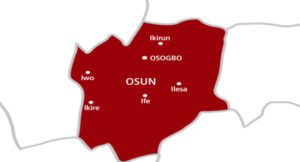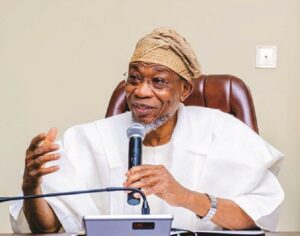
Ifẹ Day: The celebration of our culture and tradition
Witnessed by Demola Ogunfidodo ©️
Thousands of Ifẹ indigenes from all walks of life, from four corners of the globe, put their lives on hold yesterday to celebrate Ifẹ, our achievements, culture and tradition. In the bible, the sun and moon stood still as God’s people went to war. The Americans set a day for special thanks to God almighty- they call it ‘Thanks Giving Day.’
We, proud sons and daughters of Ifẹ put all our plans, lives and businesses to one side on Saturday, 10th of Dec 2022. We came together to dine and wine together. The celebrations were led by our Imperial Majesty, Ooni Adeyeye Eniitan Ogunwusi Ọjaja II. Flanked by his Oloris with Ọbalufẹ HRH Idowu Adediwura on the right and Lowa Adimula Chief Adekola Adeyeye on the left.
Baba Chief Alex Duduyemi arrived thirty minutes before Ooni, sitting on the left of the stage.
The stage was specially built for VIPs, monarchs, chiefs, government officials etc. Many Ifẹ high chiefs and other VIPs were also there. Baba Sooko Aratunde president of Ifẹ Traditional Council of Sooko sat directly behind Ooni.
The destination was the Center of Ifẹ: Ẹnuwa Square, Afẹwọnrọ Park directly opposite the palace.
Canopies were beautifully arranged side by side. Each canopy is for a specific organisation. This is an indication of a well-planned event.
The organising committee for the event was tagged ‘local organising committee (LOC) headed by Dr Yomi Layinka. I was part of LOC but must admit my attention was focused on my upcoming installation ceremony as Sooko Akinrinmade Ọbalufọn. However, I was able to attend a meeting at Town Hall. I doff my hat for all the LOC members. The event might have been a one-day event, but the planning took months. People dedicated their time, efforts and money to make sure the first ever Ife Day since the ascension of Ooni Ogunwusi celebration was a memorable occasion. Among the LOC members were Comrade Lawrence Awowoyin, President IDB, , Bar Muri Agboola, Chief T Olubodun, Mr Gbenga Adefaye, our adorable Dr Deola Shobowale, Alhaja A Opeloye, Chief K Bamgbetan, CP(Rtd) C Awotinde, Dr A Adeyeni and many more members too numerous to list here. Well done to you all.
In his usual style of gracing occasions, HIM Ooni Adeyeye Ogunwusi inspected each table and personally thanked all guests, shaking hands. Like a general at a guard of honour. The personal touch added more glamour to the event, like the colourful tasty icing on a cake.
Seeing is believing, I can only try my best to give an account of the celebrations. Nothing can replace being present at the party. Videos, pictures and even live Facebook streaming are great but the excitement of being at the Afewonro Park on the day is like being invited to a dinner at the palace… such a delight.
Like beautiful flowers in the palace garden, our ever-shining and radiant Ifẹ women were elegantly dressed for the occasion. They were all in different attires, with headgear like crowns and tiaras. Their youthful faces were adorned with bright colours, lips adored with reddish lipsticks. They don’t just walk, they were all like models on the catwalk. Ifẹ is blessed with beautiful princesses. Surrounded by hundreds of beautiful princesses, men can be forgiven for their lack of concentration at the event. Me, I tried but I must admit I struggled to remain focused on the event. Speeches were given, but I did not hear any part of them. I was mesmerised by the beautiful ladies at the event. It’s in our nature: Ifẹ men get carried away in the presence of beautiful women.
While admiring a lady, my eye caught another one walking in the other direction. I didn’t want to lose my focus on either, so, I ended up turning my head from side to side like a World Cup football referee. I wonder what this world will be like without beautiful women. “It’s a man’s world, but it will be nothing without women.“
Ifẹ mothers, aunties, Iyalode, Iyalaje, Ifẹ-omidan,abilekọ, adélébọ̀- I appreciate and adore you all.
Men refused to be outshone by women. Like our sisters and mothers at the occasion, men were also there in different coloured hats like a rainbow. Each group wore different hats, but most men wore white, flowing agbada. I chose to be different, with my Trilby blue hat, I stood out like a lone star.
Femi Oyaro, the legendary Adamo musician was on the stand to entertain us. He played all his best songs. The summer sun directly overhead was no barrier for him and his bandmates, he performed brilliantly well.
As if the music was not enough to entertain us, we also had the pleasure of being entertained by various acts: Osirigi, dancers, ẹlẹ́wọ́, and various drummers. Even representatives of Obafemi Awolowo University were there to showcase some of their best-kept secrets. To top it all, HRH Olori Aderonke Ademiluyi Ogunwusi, the business guru wife of Ooni Ogunwusi had her models perform the catwalk at the event. Their act didn’t just showcase ‘Made in Ifẹ’ adirẹ, it also added colour and glamour to the already colourful event.
Ifẹ is not just where all Yorubas call home, modern Ife is an accommodating city. Many people across the four corners of Nigeria and beyond now call Ifẹ their home. Many traditional rulers and chiefs from all over Yoruba land were present at the occasion.
Many tribes living at Ifẹ were also represented at the occasion by their elders and chiefs. They didn’t just come to eat and drink, most importantly, they all came to show their appreciation to Ooni Ogunwusi Ojaja II and Ifẹ indigenes for allowing them to live peacefully at Ife and make Ifẹ their home.
The King’s speech was the most memorable part of the event. HIM Ooni Adeyeye Ogunwusi appreciated everyone that has been involved in making the day a special day for their efforts. As always, Kabiyesi also thanked Ifẹ indigenes at home, all over Nigeria and in those diasporas. He also reminded us that no matter how good things might seem aboard, nowhere can replace the home. We must have Ifẹ at the top of our agenda.
Dr Yomi Layinka, the chairman of the Ifẹ Day planning committee also gave a brilliant speech. He appreciated Ife for making Ife Day a day to remember.
Ife Day was a rare opportunity for Ifẹ to sit together and share a good time. However, there is more to it than eating and drinking. This is a chance for Ifẹ to work together for the development of our great city.
I wasn’t just at the event luxuriating and admiring all our beautiful women. I didn’t sit in the same place all day. I walked around and spoke to lots of people. My take away from this ‘gathering of Ifẹ people’ is that we Ifes love this ‘land of fathers.’ Like many, I am optimistic that good days are slowly coming back to Ife.
While at the event, my phone kept ringing. Though I ignored most calls. However, I picked some. The conversation was all the same. “Demola how is Ifẹ Day going?” I did my best to paint a picture of glamour & pageantry that was ongoing. But, I also reminded those that called that it’s best to come home and witness this ‘special day’. Dr Yomi Layinka tagged the event “Ifẹ Day Home Coming.”
A kìí gbé òòkèèrè s’è̩sọ́. At the event, I met old friends & mates that I have not seen for over 35 years. I made new friends and exchanged contact details with many people. It was a rare networking opportunity.
Ifẹ Day; is the celebration of our culture and tradition. Let’s set a date in our diaries to actively participate in future ‘Ife Day’ ceremonies.
Ifẹ Day 2022; ojú mi l’óse.



